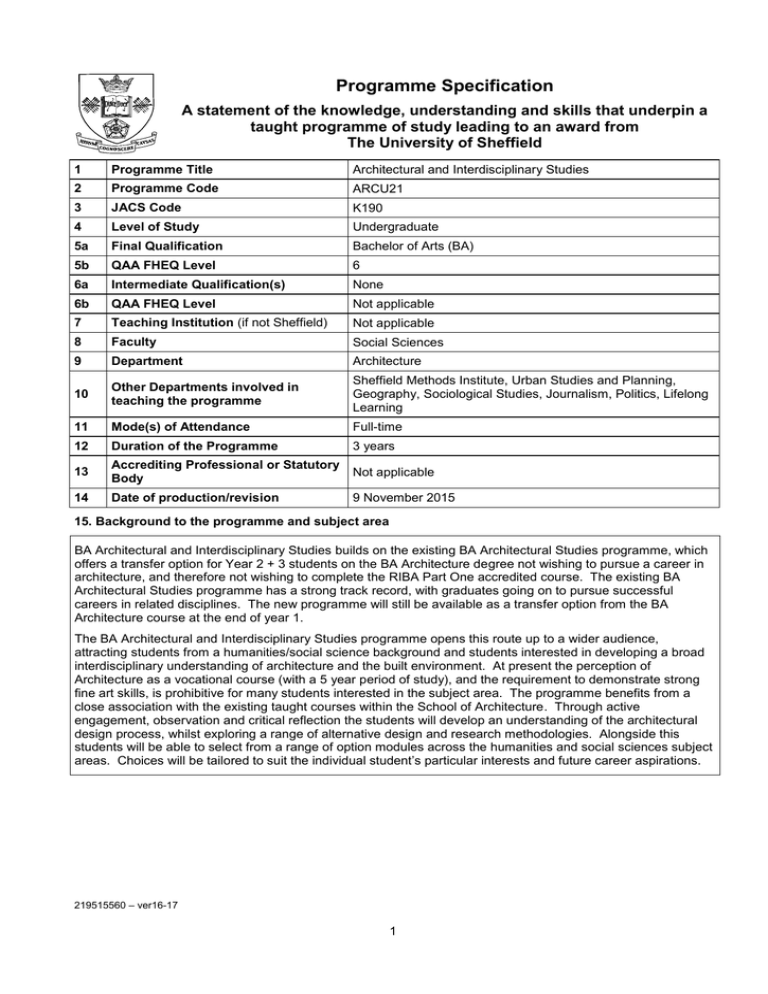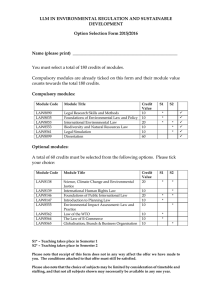Programme Specification
advertisement

Programme Specification A statement of the knowledge, understanding and skills that underpin a taught programme of study leading to an award from The University of Sheffield 1 Programme Title Architectural and Interdisciplinary Studies 2 Programme Code ARCU21 3 JACS Code K190 4 Level of Study Undergraduate 5a Final Qualification Bachelor of Arts (BA) 5b QAA FHEQ Level 6 6a Intermediate Qualification(s) None 6b QAA FHEQ Level Not applicable 7 Teaching Institution (if not Sheffield) Not applicable 8 Faculty Social Sciences 9 Department Architecture 10 Other Departments involved in teaching the programme Sheffield Methods Institute, Urban Studies and Planning, Geography, Sociological Studies, Journalism, Politics, Lifelong Learning 11 Mode(s) of Attendance Full-time 12 Duration of the Programme 3 years 13 Accrediting Professional or Statutory Body Not applicable 14 Date of production/revision 9 November 2015 15. Background to the programme and subject area BA Architectural and Interdisciplinary Studies builds on the existing BA Architectural Studies programme, which offers a transfer option for Year 2 + 3 students on the BA Architecture degree not wishing to pursue a career in architecture, and therefore not wishing to complete the RIBA Part One accredited course. The existing BA Architectural Studies programme has a strong track record, with graduates going on to pursue successful careers in related disciplines. The new programme will still be available as a transfer option from the BA Architecture course at the end of year 1. The BA Architectural and Interdisciplinary Studies programme opens this route up to a wider audience, attracting students from a humanities/social science background and students interested in developing a broad interdisciplinary understanding of architecture and the built environment. At present the perception of Architecture as a vocational course (with a 5 year period of study), and the requirement to demonstrate strong fine art skills, is prohibitive for many students interested in the subject area. The programme benefits from a close association with the existing taught courses within the School of Architecture. Through active engagement, observation and critical reflection the students will develop an understanding of the architectural design process, whilst exploring a range of alternative design and research methodologies. Alongside this students will be able to select from a range of option modules across the humanities and social sciences subject areas. Choices will be tailored to suit the individual student’s particular interests and future career aspirations. 219515560 – ver16-17 1 16. Programme aims 1. To equip students with the knowledge and skills to work across the disciplines engaged in the shaping of the built environment. 2. To encourage a deep understanding of architecture’s historical, cultural and social context. 3. To give a local, regional and global perspective on current social, economic, and environmental issues, and their impact on architecture and the city. 4. To actively engage with innovative research and teaching practice within the School of Architecture. 5. To encourage students to develop an individual critical approach to their learning. 6. To widen participation in, and to broaden the definition of, architectural education. 17. Programme learning outcomes Knowledge and understanding: K1 Knowledge and understanding of architectural history and theory. K2 Knowledge of local, regional and global social, economic, and environmental contexts. K3 Understanding of creative process and a variety of design approaches. K4 Knowledge and experience of a broad range of research methods. K5 Understanding of one or more related disciplines. Skills and other attributes: S1 Experience of and ability to make use of a wide range of communication and media skills. S2 Ability to analyse and process information and evidence based data. S3 Experience of report writing. S4 Ability to think creatively and strategically in complex situations. S5 Experience of independent working, group working and interdisciplinary collaboration. 18. Teaching, learning and assessment Development of the learning outcomes is promoted through the following teaching and learning methods: lectures K1 K2 K3 K4 K5 S1 S2 S3 S4 S5 seminars / / / / / / / tutorials workshop Work Placement / / / / / / / / / / Individual project / / / / / / / / / 219515560 – ver16-17 2 / / / Opportunities to demonstrate achievement of the learning outcomes are provided through the following assessment methods: Written exam. K1 K2 K3 K4 K5 S1 S2 S3 S4 S5 / / On-going assess. / / / / / / / / / / Studio review Extended essay / / / / / / / / / / / 19. Reference points The learning outcomes have been developed to reflect the following points of reference: The BA Architectural and Interdisciplinary Studies responds to the University Learning and Teaching Strategy, and promotes the attributes of the Sheffield Graduate. In particular the programme combines ‘research informed disciplinary knowledge and skills, wider transferable skills, professional competence, cultural agility and real world engagement.’ The programme meets the aspiration for students ‘to learn and develop personally through experiences outside the University, in particular reflecting the University’s mission as a civic institution.’ This is achieved both through Sheffield based activities and through the semester long work placement. This is the first programme offered by the School of Architecture which allows students to ‘take a modern language or to deepen their understanding of a second (or third) language they already know.’ as a creditbearing part of the course. Built environment professionals operate in a global market place, and the development of language skills will enhance future employability. The programme responds to the University Learning and Teaching Strategy’s desire to ‘enhance the flexibility of delivery’ and to encourage ‘new models of inter-disciplinary programmes.’ with students taking ‘a minimum of 20 credits outside the core department(s) in both levels 1 and 2.’ The programme has a strong focus on employability, with students encouraged to make module choices and select a work placement based on their intended future career path. The programme follows the guidelines for Implementation of the Frameworks for Higher Education Qualifications of UK Degree Awarding Bodies (FHEQ) at the University of Sheffield relevant to a FHEQ level 6 qualification, with learning outcomes aligned to the descriptors for that level. The programme incorporates an approximately equal balance between architectural and interdisciplinary components. The programme meets the Descriptor for a higher education qualification at level 6 on the FHEQ: bachelor's degree with honours as defined in the UK Quality Code for Higher Education; Part A: Setting and Maintaining The Frameworks for Higher Education Qualifications of UK Degree-Awarding Bodies. Development of the programme has made reference to the FHEQ Subject Benchmark Statement for Architecture, although this for the most parts relates to the professionally accredited courses. The majority of modules taken are long established, and have been developed in accordance with the relevant Subject Benchmarks. 219515560 – ver16-17 3 20. Programme structure and regulations Year 1 Architecture – 60 credits ARC150 AIS1 ARC103 Humanities 1 ARC104 Humanities 2 ARC125 Architectural Design 1 IPS101 Achieve More Option modules (FSS) – 40 credits Choice of modules in line with the Minor Routes offered by Sheffield Methods Institute offered by: Geography Sociology Politics Urban Studies and Planning Journalism Unrestricted modules – 20 credits Students will be encouraged to take a foreign language module relevant to their work placement 10 credits 10 credits 10 credits 30 credits Year 2 Architecture – 70 credits ARC250 AIS2 ARC203 Humanities 3 ARC260 Work Placement IPS201 Achieve More Option modules (FSS) – 30 or 40 credits Choice of modules in line with the Minor Routes offered by Sheffield Methods Institute offered by: Geography Sociology Politics Urban Studies and Planning Journalism Unrestricted modules – 10 or 20 credits Students will be encouraged to take a foreign language module relevant to their work placement 10 credits 10 credits 50 credits Year 3 Architecture – 60 credits ARC350 AIS3 ARC303 Humanities 5 ARC360 Extended Study IPS301 Achieve More Option modules (FSS) – 40 credits Choice of modules in line with the Minor Routes offered by Sheffield Methods Institute offered by: Geography Sociology Politics Urban Studies and Planning Journalism Unrestricted modules – 20 credits Students will be encouraged to take Arts and Humanities modules relevant to their career path 10 credits 10 credits 40 credits The Architectural and Interdisciplinary Studies core module in each year gives the cohort a clear identity, distinct from the professionally accredited courses. The teaching will be seminar based and will encourage individual critical reflection. Students will engage with the design studio – both undergraduate and MArch/PGT live projects – in a different way, observing and reflecting on the design process. Students will be encouraged to identify and develop their own agenda related to their individual career aspirations. Assessment will take place through the submission of a reflective diary and written assignments. The Year 2 work placement will be a semester long internship in a place of work relevant to the individual student’s career aspirations – e.g. publishers, museums/galleries, creative industries, local authorities, etc. 219515560 – ver16-17 4 These will be arranged through the International Relations Office and the Erasmus programme, supported by the Careers Service Placement Team. The Year 3 Extended Study module is based on the existing Year 3 Special Study module taken by students on the professionally accredited course. The remaining Architecture core modules are existing modules offered as part of the professionally accredited undergraduate courses within the School of Architecture. Option modules will be taken within the Faculty of Social Sciences, and students will be assisted in making choices relevant to their chosen career pathway. These will include modules offered by the Sheffield Methods Institute and the Departments of Geography, Sociology, Politics, Urban Studies and Planning, and Journalism. Unrestricted modules will primarily be based in the Faculty of Arts and Humanities (Archaeology, History, Modern Languages, and Philosophy). Students will be helped to identify modules appropriate to their particular interests and career aspirations. All students will be encouraged to take a foreign language as part of their studies, which will assist them when seeking a work placement abroad. Progression will be in accordance with the normal University Regulations, and not the School of Architecture’s special regulations, which only apply to the professionally accredited courses. The BA Architectural and Interdisciplinary Studies will be offered as a transfer option to students studying on the BA Architecture degree at the end of Year 1 and Year 2. This is likely to be attractive to students who are strong in humanities, but struggling with the design studio and/or technology components of the Architecture course, and who no longer wish to complete the RIBA Part One accredited course. Detailed information about the structure of programmes, regulations concerning assessment and progression and descriptions of individual modules are published in the University Calendar available on-line at http://www.shef.ac.uk/govern/calendar/regs.html. 21. Student development over the course of study The programme provides students with the intellectual and practical skills to understand and engage with architecture and the built environment, learning relevant skills and tools from architecture and other related disciplines. A flexible pathways approach to learning encourages students to be proactive in tailoring the course to suit their particular interests and career aspirations. The programme encourages independent study and agile problem solving. Year 1 will give students a strong foundation, introducing them to a range of research and design methodologies and techniques relevant to architecture and interdisciplinary practice. This will be understood in the context of local and global historical, social, economic and environmental issues. Year 2 will allow students to develop their individual attitude and approach, by selecting course content relevant to their particular interests, and through the experience gained on the semester long work placement. Year 3 will allow students to apply their learning to an individual research project, using skills of critical analysis, visualisation, representation and communication. Throughout the course students will gain experience of independent working, group working and interdisciplinary collaboration, enabling them to become skilled problem solvers. There will be a strong focus on employability, with students encouraged to make informed choices relevant to their particular interests and aspirations, developing a broad range of transferrable research and communication skills. 22. Criteria for admission to the programme Entry requirements are outlined here: http://www.sheffield.ac.uk/architecture/undergraduate/entry 23. Additional information This specification represents a concise statement about the main features of the programme and should be considered alongside other sources of information provided by the teaching department(s) and the University. In addition to programme specific information, further information about studying at The University of Sheffield can be accessed via our Student Services web site at http://www.shef.ac.uk/ssid. 219515560 – ver16-17 5



